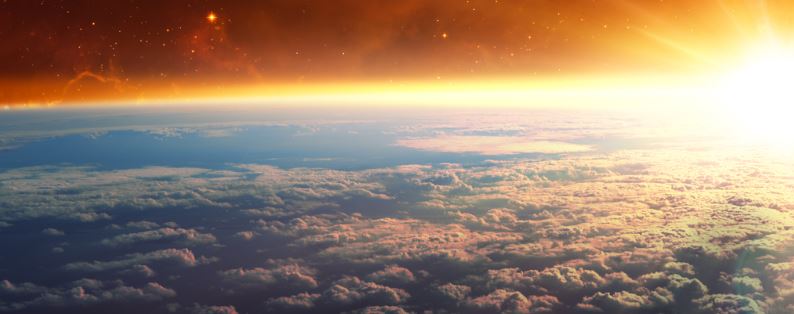


 5:46:25
5:46:25  2024-04-14
2024-04-14  1338
1338

As nearly every climate indicator grows increasingly dire, calls for extreme technological fixes get louder. However, study after study finds that taking a gamble on forced geoengineering comes with its own dangerous risks.
New research warns that if we inject sulfate particles into the atmosphere to attempt to reflect sunlight and mimic the cooling effects of volcanic eruptions and they don't end up in the right position, they could cause further warming and even worse climate anomalies than burning greenhouse gases as usual.
"We found that some detrimental effects of this injection are of a similar magnitude to those from climate change itself in some regions," ETH Zürich atmospheric scientist Elia Wunderlin and colleagues write in their paper.
The team used aerosol-chemistry climate models and microphysics principles to simulate the behavior of sulfate aerosols if they were to be injected into the stratosphere above equatorial latitudes.
The equator was previously identified as a target site because aerosols would remain aloft there for the longest durations.
"We confirm that with increasing injection amounts, the cooling efficiency would decrease," the researchers write.
Their results reveal that once levels of sulfur particles in the atmosphere reach a new equilibrium two to three years after a proposed injection, planetary surface cooling of about 1 °C could be achieved.
However there will also be strong heating in the lower tropical stratosphere, thanks to the sulfate absorbing long wave heat that radiates from Earth's surface.
If greenhouse gas emissions continue to increase over this time too (we have no evidence we humans are slowing down with those), weather systems in the northern hemisphere will become more extreme through winter, changing how two entire atmospheric layers, the stratosphere and troposphere, interact.
"We show that this heating significantly affects the meridional temperature gradient in the stratosphere, thereby altering zonal winds, the ozone layer, [and] water vapor transport from the troposphere," Wunderlin and team explain "even causing larger anomalies than unabated greenhouse gas emissions."
What's more, increasing aerosol concentrations in the stratosphere could push the movement of atmospheric chemicals (including the aerosols) into a biannual instead of annual cycle.
The models revealed that increasing the thickness of the stratosphere's aerosol layer leads to lower stratospheric winds, lengthening the duration of natural cycling.
"[This shows] the ability of aerosols to modulate their own stratospheric transport pathways and residence time," the researchers write.
The consequences of such a cycle change would have huge implications for weather patterns, including increased flooding risks in Europe.
The team suggests that other potential aerosols could be investigated to mitigate some of these problems, such as diamond because it won't absorb Earth's surface heat, or calcite which wouldn't interfere with the ozone layers.
"However, these could pose other (unknown) challenges, which need to be further investigated," they caution.
Their findings add to a growing list of research highlighting the risks of forced geoengineering, which include losing more of the ozone layer, changing global rain patterns, and further disruptions to ecological systems.
Alternatively, one type of geoengineering poses far less risk and guarantees benefits. Restoring native ecosystems has massive potential to help stabilize our climate without introducing such extreme risks and unknowns.
However, despite being a much surer and safer bet, this option doesn't appear to attract nearly as much attention, fanfare, or funding.
Regardless of future strategies, transitioning away from fossil fuels is essential to addressing our climate situation. However, usage continues to rise, and corporations receiving public funding are making record profits.
Reality Of Islam |
|

A 1.98-squa

Researchers

A well-know

Scientists
 9:3:43
9:3:43
 2018-11-05
2018-11-05
10 benefits of Marriage in Islam
 7:5:22
7:5:22
 2019-04-08
2019-04-08
benefits of reciting surat yunus, hud &
 9:45:7
9:45:7
 2018-12-24
2018-12-24
advantages & disadvantages of divorce
 11:35:12
11:35:12
 2018-06-10
2018-06-10
 6:0:51
6:0:51
 2018-10-16
2018-10-16
 9:50:37
9:50:37
 2023-02-28
2023-02-28
 6:28:21
6:28:21
 2022-12-20
2022-12-20
 7:26:19
7:26:19
 2022-04-08
2022-04-08
 4:25:57
4:25:57
 2023-02-11
2023-02-11
 3:43:50
3:43:50
 2022-11-05
2022-11-05
allah will not answer all your prayers
 6:56:28
6:56:28
 2022-01-01
2022-01-01
 7:34:7
7:34:7
 2023-02-28
2023-02-28
 5:41:46
5:41:46
 2023-03-18
2023-03-18
| LATEST |